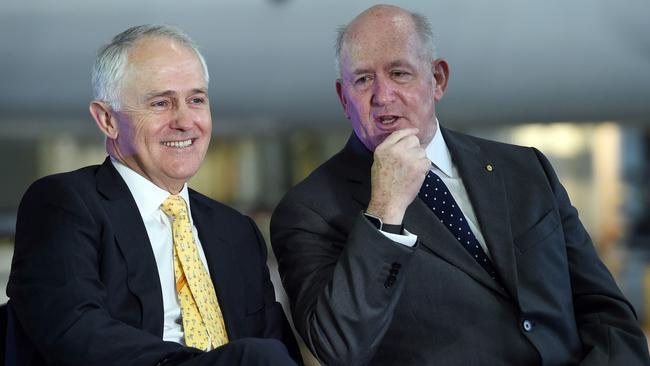
Sir Peter’s track record as governor-general and his method of dealing with prime ministers highlights how he would have dealt with any crisis involving Mr Dutton’s election as Liberal leader: he would have left the issue of Mr Dutton’s eligibility to the parliament to resolve and made no judgment himself.
Insiders report that while Mr Turnbull — fighting for his survival — told senior colleagues and Attorney-General Christian Porter that the governor-general would not swear in Mr Dutton if elected by the Liberal Party, this claim did not reflect Sir Peter’s position. It was not based on a view offered by the governor-general to the prime minister.
In short, Sir Peter’s view coincided with the argument put by Mr Porter in his confrontation that week with an embattled prime minister Turnbull. Mr Porter — as first reported in The Australian last month — told Mr Turnbull he was “wrong at law” and if the prime minister went public saying the governor-general could not commission Mr Dutton then Mr Porter as Attorney-General would publicly repudiate him.
The conflict within the government over the governor-general’s role was triggered by revelations at the time that Mr Dutton could be in breach of section 44 (v) of the Constitution relating to pecuniary interests because of his wife’s ownership of childcare centres receiving subsidies from the national government. Mr Turnbull seized upon this to argue that the Liberals could not elect Mr Dutton because of doubts about his eligibility to sit as an MP.
The nation faced a potential constitutional crisis, with Mr Turnbull insistent the governor-general could not swear in Mr Dutton and apparently prepared to offer such advice while Mr Dutton, if elected by the partyroom, would have advised Sir Peter that he should be commissioned as prime minister.
Sir Peter’s method of dealing with prime ministers was to engage in frank and supportive discussions. Mr Turnbull knew he could ring the governor-general to discuss issues. The prime minister spoke to the governor-general during the crisis but Mr Turnbull’s claim to his Attorney-General that “I know the governor-general” and “I know this would be his position” was not based on statements Sir Peter had made to Mr Turnbull at the time.
Indeed, insiders report Sir Peter would have viewed any decision not to commission Mr Dutton as a further extension of the reserve powers of the governor-general that would have been inappropriate in the circumstances.
During their confrontation, Mr Porter offered Mr Turnbull his resignation, given the prime minister refused to accept his view of the reserve powers. This prompted Mr Turnbull’s sarcastic retort: “Oh no, I wouldn’t want to lose my loyal Attorney-General.”
On Thursday, August 23, when Mr Porter asked Mr Turnbull whether the governor-general had directly told him he would not commission Mr Dutton, the prime minister gave an evasive answer.
On August 24, the day of the partyroom ballot, Mr Porter gave the prime minister a copy of the Solicitor-General’s opinion — essentially clearing Mr Dutton — and had his office contact Government House with a message: the Attorney-General was available to speak to Sir Peter if required.
That meant Mr Porter was ready to advise the governor-general he was getting false advice from Mr Turnbull if the deposed Liberal leader (but still prime minister) insisted on telling Sir Peter not to commission Mr Dutton.
This contingency did not eventuate, as Mr Dutton lost the final ballot 45-40 to Mr Morrison. It is now clear, however, that Sir Peter would not have accepted the view that, acting on a section 44 (v) issue, he should use his discretion not to commission a new leader.
Whether Mr Turnbull would have given such advice must await his book next year. But there is no doubting his vehemence at the time or his belief that commissioning a prime minister with eligibility doubts could create a nightmare over the validity of future decisions. Nor is there any doubt about his disagreement with the Solicitor-General’s advice in essentially clearing Mr Dutton of the section 44 (v) problem.
Government House has confirmed for The Australian that “no formal advice was sought or provided” on Mr Dutton’s eligibility.
In the documents he gave Mr Turnbull on the Friday morning, Mr Porter offered his own separate and attached advice on the governor-general’s role, the essence being the only factor Sir Peter should consider was whether the new leader had the confidence of the house — and that section 44 (v) was not relevant.
Mr Porter wanted to ensure his advice to Mr Turnbull was clear and documented. The governor-general never saw this advice. In the end, it was not relevant.
Yet it buttressed the view Sir Peter had formed. None of this contradicts the reality of the Cosgrove-Turnbull relationship — as governor-general and prime minister they enjoyed a frank and effective relationship at the highest level of government.




Former governor-general Sir Peter Cosgrove spoke informally to then prime minister Malcolm Turnbull during last year’s leadership crisis but did not say or agree that he would decline to swear in the challenger Peter Dutton if he won a partyroom ballot.